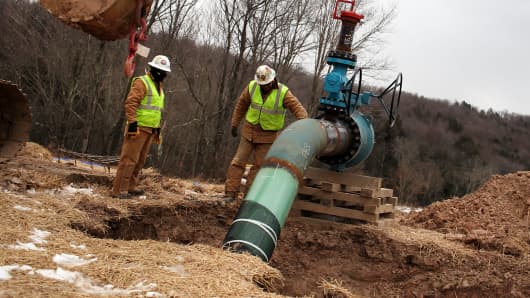As the U.S. produces more of its own energy, pressure is mounting on the federal government to move quickly to export its natural gas bounty—a move that has encountered stiff resistance from some energy market players.
Natural gas, an abundant fuel source that is cheaper and cleaner than standard gasoline, is increasingly seen as a successor to diesel and regular gas, particularly as the world's largest economy produces more of it.
The recent surge in shale oil production has turned the U.S. from an importer of natural gas into a producer creating upwards of 2 million barrels per day, according to the Energy Information Administration.
That surplus has sparked a wide debate about how the U.S. should deploy natural gas for its economic benefit. At Bloomberg's New Energy Finance conference this week, natural gas exports was a hot topic among several participants.
"I believe very strongly in free trade and the responsible development of American energy exports, with an eye toward job creation and increased prosperity," Alaska Senator Lisa Murkowski, the ranking Republican on the Senate Energy Committee, told conference participants.
At the Bloomberg conference, the head of energy giant Hess' natural gas unit expressed hope that the Department of Energy would approve a Hess export facility soon.
The agency is finding itself fielding a growing number of requests to expedite the process, which would sanction more U.S. companies as natural gas exporters.
"The Department of Energy should move forward with timely purpose on the applications that are pending before it for the construction of LNG [liquified natural gas] export facilities," Murkowski told the conference. "We are already exporting record levels of gas to Mexico by pipeline. There's no economic reason not to expand that trade if the market conditions allow."
Yet exporting natgas is easier said than done, according to some energy market watchers. Companies active in the market are resistant to the idea of U.S. energy stocks getting shipped abroad, especially after years of hard-fought battles to spur more domestic production.
Last month, the Brookings Institution published a study showing how an increase in natural gas exports could help satisfy growing international demand for both natgas and other types of U.S.-produced fuels.
Yet opponents cite that jump in global demand as a trigger behind a potential surge in prices that could challenge natural gas's reputation as a cheap alternative energy source. Proponents, however, take a different view.
(Read More: Natural Gas Prices on the Rise, Challenging 'Cheap' Label)
"We have a situation where we're generating so much gas. All indications are that it would have a small price effect but generate more jobs, so we'll be better off," John Felmy, chief economist of the American Petroleum Institute, said in a recent interview.
"Some people think we should keep it here [but] this is a case where the market should be allowed to work," he said.
All of which suggests the DoE may find itself between a rock and a hard place in trying to quell the push to export natural gas, and the domestic forces arrayed against such a move. Supporters of natgas shipments think market demand might make it hard for the DoE to ignore the calls.
"Eventually [the U.S.] is going to have to. The economic argument is there," Allen Gilmer ,CEO of DrillingInfo, told conference's participants.
"The reality is that the cheap use of natural gas in the United States isn't going to go away, and we don't have the facilities right now to make a huge impact" on the global market, he said.



